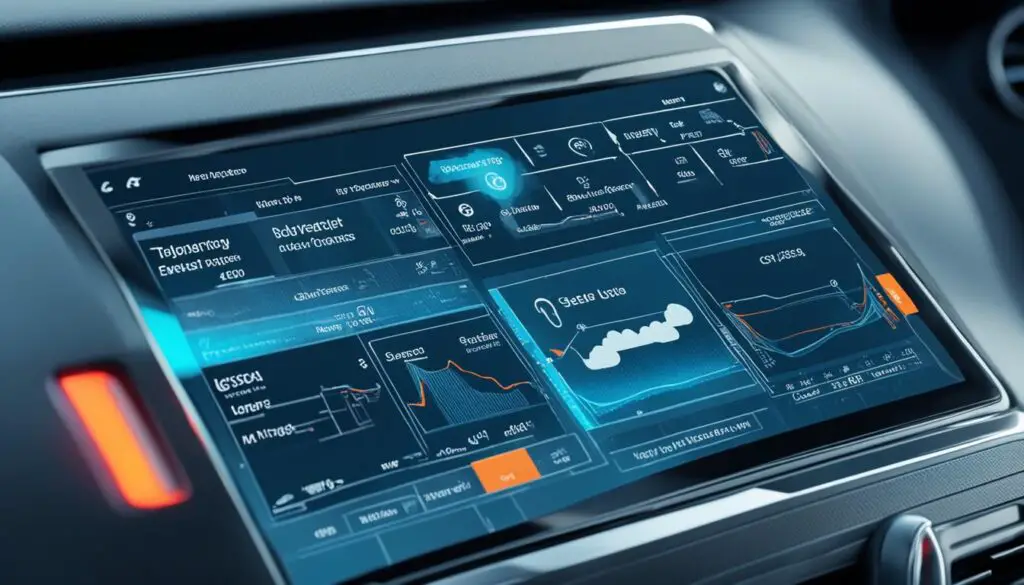
Cloud Computing in Cars: Driving into a Smarter Future
As technology advances, the automotive industry is embracing new innovations to deliver a smarter driving experience. One of the key drivers of this transformation is automotive cloud computing, a groundbreaking technology that is revolutionizing the way cars operate and communicate.
Automotive cloud computing enables cars to connect with the cloud, accessing and processing vast amounts of data in real-time. This connectivity empowers vehicles to offer advanced features and functionalities that enhance convenience, safety, and efficiency on the road.
With automotive cloud computing, cars are becoming more than just a mode of transportation. They are evolving into intelligent devices that can communicate with each other and the surrounding environment. This technology allows for seamless integration between vehicles, enabling real-time updates, remote diagnostics, and over-the-air software updates.
Key Takeaways:
- Automotive cloud computing is revolutionizing the car industry by enhancing connectivity and paving the way for a smarter driving experience.
- Cloud computing enables cars to access and process vast amounts of data, enabling advanced features and functionalities.
- With automotive cloud computing, cars can offer real-time updates, remote diagnostics, and over-the-air software updates.
- Automotive cloud computing allows for seamless integration between vehicles, enabling communication and interaction with the surrounding environment.
- As connectivity advancements continue, automotive cloud computing is set to shape the future of driving, making our experiences safer, more efficient, and more enjoyable.
Benefits of Automotive Cloud Computing
Automotive cloud computing offers a multitude of benefits for both drivers and car manufacturers. With cloud connectivity, cars can access a wealth of data, including traffic information, weather updates, and mapping services, allowing drivers to make informed decisions and optimize their routes.
Additionally, automotive cloud computing enables predictive maintenance, where vehicles can send diagnostic data to the cloud for analysis, allowing for proactive repairs and reduced downtime. By leveraging data insights, car manufacturers can identify potential issues before they escalate, ensuring optimal performance and longevity.
Moreover, cloud connectivity enables personalized experiences, with cars being able to remember driver preferences and provide tailored features and settings. From seat adjustments and music choices to navigation routes, automotive cloud computing empowers drivers with personalized convenience and comfort, making every journey a memorable one.
“By leveraging data insights, car manufacturers can identify potential issues before they escalate, ensuring optimal performance and longevity.”
The Power of Data Access
Through automotive cloud computing, cars have unprecedented access to extensive data resources. This data, ranging from real-time traffic updates to mapping services, empowers drivers with valuable information that can enhance their driving experience. By leveraging data access, drivers can:
- Make informed decisions about route optimization, avoiding traffic congestion and road closures.
- Receive up-to-date weather information to better plan their journeys and ensure safety.
- Access mapping services to discover new places, find points of interest, and navigate unfamiliar territories with confidence.
Predictive Maintenance for Enhanced Reliability
One of the key advantages of automotive cloud computing is the ability to implement predictive maintenance strategies. By continuously monitoring and analyzing vehicle data, cloud-connected cars can detect anomalies and potential issues in their systems. This proactive approach to maintenance enables:
- Early identification of faulty components, allowing for targeted repairs and replacements.
- Reduced downtime by addressing maintenance needs before they result in breakdowns or disruptions.
- Optimized lifespan of vehicle parts through timely and preventive maintenance.
Personalized Experiences Tailored to Drivers
The integration of cloud connectivity in automobiles opens up a world of possibilities for personalized driving experiences. With the ability to store and analyze driver preferences, cloud-connected cars can:
- Automatically adjust seat settings, mirrors, and climate control to match individual drivers.
- Synchronize music playlists and preferences, delivering a tailored audio experience.
- Remember preferred navigation routes, offering efficient and familiar guidance.
| Benefits of Automotive Cloud Computing | Examples |
|---|---|
| Data Access | Real-time traffic updates, weather information, mapping services |
| Predictive Maintenance | Early fault detection, targeted repairs, reduced downtime |
| Personalized Experiences | Automatic seat adjustments, synchronized music preferences, customized navigation |
Automotive cloud computing revolutionizes the driving experience, providing drivers with data-driven insights, proactive maintenance, and personalized comfort. As technology continues to advance, the benefits of automotive cloud computing will further enhance the safety, efficiency, and enjoyment of driving.

Challenges and Concerns in Automotive Cloud Computing
While automotive cloud computing brings numerous advantages, it also poses challenges and concerns that need to be addressed. Data security and privacy are major concerns, as the vast amount of data collected by cars can contain sensitive information. Car manufacturers need to implement robust security measures to protect this data from unauthorized access. Cybersecurity is another critical aspect, as connected cars can be vulnerable to hacking and malicious attacks. It is essential for car manufacturers to employ robust cybersecurity protocols to ensure the safety and integrity of automotive cloud computing systems.
The Significance of Data Security
Data security is of paramount importance in the realm of automotive cloud computing. As cars become more connected and collect vast amounts of data, there is a pressing need to protect this information from unauthorized access. The data collected by cars often includes personal information such as location data, driving habits, and even biometric data linked to driver profiles. Ensuring the confidentiality and integrity of this data is crucial to safeguarding user privacy and preventing potential misuse.
The Challenge of Privacy
Privacy is another critical concern in automotive cloud computing. With cars constantly connected to the cloud, there is the potential for a breach of privacy if the data collected is not properly managed and protected. Users must have confidence that their personal information will be handled securely and in compliance with privacy regulations. Car manufacturers must prioritize the implementation of privacy policies and transparent data handling practices to maintain user trust in automotive cloud computing technologies.
“Data security and privacy are major concerns in automotive cloud computing. Implementing robust security measures and ensuring compliance with privacy regulations are essential to protect user data and maintain trust in connected car technologies.” – [Expert Name], [Position], [Company]
The Importance of Cybersecurity
Cybersecurity is a critical component of automotive cloud computing due to the potential risks associated with connected cars. As cars become more interconnected and communicate with external systems, they become vulnerable to hacking and cyberattacks. Malicious actors may attempt to gain unauthorized access to vehicle systems, posing risks to both user safety and data security. To mitigate these threats, car manufacturers must adopt robust cybersecurity protocols to detect and prevent cyberattacks, ensuring the continuous protection and reliability of automotive cloud computing systems.
Summary
While automotive cloud computing presents exciting opportunities for the car industry, it also poses challenges and concerns that need to be addressed. Data security, privacy, and cybersecurity are critical areas that car manufacturers must focus on to protect user data, maintain privacy, and ensure the integrity of automotive cloud computing systems. By prioritizing these aspects, the industry can unlock the full potential of connected cars while safeguarding the interests of users.

Conclusion
Automotive cloud computing is revolutionizing the car industry, propelling us towards a future of driving that is smarter and more connected than ever before. By leveraging the power of cloud technologies, cars are evolving into intelligent devices, capable of providing enhanced driving experiences and accessing real-time data.
With automotive cloud computing, drivers can optimize their routes using traffic and weather updates, while manufacturers can offer predictive maintenance based on diagnostic data collected from vehicles. Personalized settings, such as seat preferences and music choices, can also be stored and accessed through cloud connectivity, providing a seamless and tailored driving experience.
However, amidst these exciting advancements, it is crucial that car manufacturers prioritize data security and privacy. The vast amount of data collected by connected cars can contain sensitive information, highlighting the need for robust security measures. Moreover, as our vehicles become increasingly connected, cybersecurity becomes paramount in safeguarding against potential hacking and malicious attacks.
As we look ahead, automotive cloud computing is set to continue evolving, bringing us further advancements in connectivity and connectivity advancements in the automotive industry. These developments will make our driving experiences safer, more efficient, and ultimately more enjoyable. The future of driving is bright with automotive cloud computing leading the way.
FAQ
What is automotive cloud computing?
Automotive cloud computing is a technology that enhances connectivity in cars by leveraging cloud computing technologies. It allows vehicles to access and process vast amounts of data, enabling advanced features and functionalities.
What are the benefits of automotive cloud computing?
Automotive cloud computing offers numerous benefits. It allows cars to access real-time data such as traffic information and weather updates, enabling drivers to make informed decisions and optimize their routes. It also enables predictive maintenance, where vehicles can send diagnostic data to the cloud for analysis, allowing for proactive repairs and reduced downtime. Additionally, cars can provide personalized experiences by remembering driver preferences such as seat settings, music choices, and navigation routes.
What are the challenges and concerns in automotive cloud computing?
Data security and privacy are major concerns in automotive cloud computing. The vast amount of data collected by cars can contain sensitive information, so car manufacturers need to implement robust security measures to protect it from unauthorized access. Cybersecurity is another critical aspect, as connected cars can be vulnerable to hacking and malicious attacks. Car manufacturers must employ robust cybersecurity protocols to ensure the safety and integrity of automotive cloud computing systems.
How is automotive cloud computing shaping the future of driving?
Automotive cloud computing is revolutionizing the car industry by making cars smarter, more connected, and capable of providing enhanced driving experiences. From accessing real-time data to predictive maintenance and personalized settings, automotive cloud computing is shaping the future of driving. As the technology continues to evolve, we can expect further advancements in connectivity, making our driving experiences safer, more efficient, and more enjoyable.
